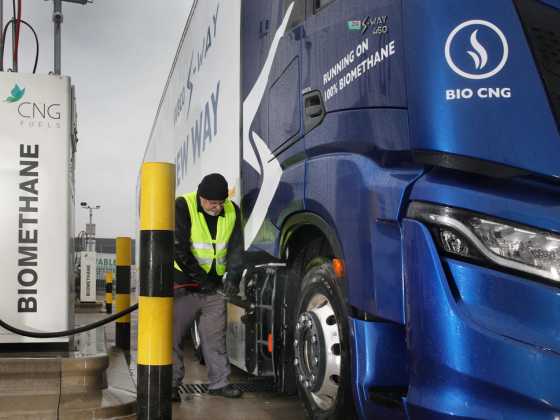An update on the biodiesel market
What’s happened in the wake of the government’s decision to remove the tax support for biodiesel made from used cooking oil?
 In April 2012, the Government made the decision to remove the tax support for biodiesel made from used cooking oil, which many argue has tipped the UK sustainable biodiesel industry into crisis.
In April 2012, the Government made the decision to remove the tax support for biodiesel made from used cooking oil, which many argue has tipped the UK sustainable biodiesel industry into crisis.
A thriving UK manufacturing sector, biodiesel made from used cooking oil (UCO) had begun to provide a very real low carbon fuel option, particularly for LGVs, for whom other low carbon fuel options are proving elusive.
With carbon savings of almost 90 per cent against the use of mineral diesel, an increasing number of vehicle fleets were adopting the fuel, creating a vibrant supply chain in the UK. By 2012 there were over 30 producers in the UK, collecting waste cooking oil from restaurants, pubs and food manufacturers around the UK and converting it in to biodiesel.
Previously, used cooking oil would be flushed down the drains, causing huge fat build-ups in the drainage system and costing utility companies some £15m per year to clear; or it was sent to landfill, creating greenhouse gas emissions.
Carbon savings through the supply chain meant that greenhouse gas emissions were dramatically reduced for LGVs using high blends of biodiesel made from UCO. In addition, as producers set up around the country, manufacturing jobs were created and green skills developed. Producers began to turn their attention to developing second generation biofuels, looking at additional waste streams that might be converted to fuel.
Transport fleet managers were delighted with the results. Leading green organisations such as 3663 First for Foodservice, McDonalds, Stagecoach and the Environment Agency, recognised that using high-blends of biodiesel in their fuel delivered unmatched carbon savings, reducing their impact on the environment.
Government Support
The 20 pence per litre tax differential, originally offered to all biodiesel, but then targeted specifically to biodiesel derived from waste oils, meant that producers could offer this green fuel to customers at an equivalent price to mineral diesel, so making it a competitive offer in a highly price sensitive market for fuel.
Meanwhile, the big suppliers of fuels at the pumps, were obliged to provide a certain percentage of their fuel as biofuel. If suppliers fell short of this percentage, they could buy out their obligation by buying certificates from the biodiesel producers to match their required litreage, which provided an additional revenue stream for the small biodiesel producers.
All Change
In April 2010 the Government stated that it would remove the tax differential offered to biodiesel produced from used cooking oil by April 2012.
They said that, instead, the producers should rely on the certificate trading with the obligated suppliers to offset the cost of producing the biodiesel.
Instead of one certificate being offered per litre of biodiesel from waste, two certificates would be offered and therefore double the value.
The Government stated that the value of each certificate would be 20p per certificate/litre and therefore for each litre of biodiesel produced, producers would receive 40p. They argued that this would equate to the 20p per litre tax benefit plus one certificate at 20p.
Director of the UK Sustainable Biodiesel Alliance, Tracey O’Keefe: “We tried to tell H M Treasury and the DfT that this policy would be a disaster for the UK biodiesel producers. The obligated suppliers will use a number of methods to meet their obligation, including purchasing cheap bioethanol from abroad, and so only come to the certificate market to buyout their obligation on a highly unpredictable basis. All of the evidence from the market on the trading of certificates showed that, due to a myriad of global factors, certificates were in fact trading at anything from 0p to 13p at any one time, far short of the 20p per litre that the Government had predicted. The highly stable tax differential was to be replaced by a highly unstable and unpredictable revenue stream which would impact producer profitability and investment very quickly.”
O’Keefe continued: “We explained that if the Government was committed to renewable energy, they had to understand that green fuels cost more to produce than fossil fuels and that we had to take a longer term view of the massive costs coming down the line if we don’t try to tackle carbon emissions on our roads now.
“The tax differential had proved itself to be a highly effective and stable mechanism ensuring that used cooking oil had become the primary feedstock for biodiesel in the UK and, with its 90 per cent carbon saving, had enabled the Government to exceed its road transport emissions target by eight per cent.
“We argued that if producers were not supported, they would not be able to produce fuels at equivalent cost to mineral diesel. If prices settled above the price of mineral diesel, LGV operators would have no choice but to return to fossil fuels, as margins will not permit them to make an unsustainable fuel choice, whatever their commitment to the environment. Particularly in this economic environment it was critical for biodiesel producers to remain competitive.”
What happened next?
The UKSBA continually pushed for Government to recognise that the UK biodiesel sector was creating jobs across the country and developing vital green skills - all to no avail; the Government pulled the plug and on 1 April 2012 the tax differential was removed.
The results speak for themselves. Certificate prices have remained volatile and vary between 0p to 11p resulting in income to producers of a maximum of 22p per litre versus the Government’s predicted values of 40p per litre. Production costs remain high and, in a bid to remain competitive, producers have had to absorb the additional cost to retain their customers. For many this has meant that they have had to cease production and the number of producers making biodiesel from waste has reduced by a third in the nine months since the tax support was withdrawn.
Since the removal of the differential, the proportion of biodiesel has reduced from approximately 60 per cent of all biofuel used in the UK to 36 per cent in the first quarter, with a corresponding increase in bioethanol, whilst the proportion of biofuel made from used cooking oil has also reduced dramatically. This has had the effect of reducing greenhouse gas savings in the UK and, increased the biofuel made from crops.
Instead of used cooking oil, the largest feedstock for biofuel is now US corn – bad news not only for the ‘food for fuel effect’ on food pricing, but for the reduced carbon saving which comes from such feedstocks and the additional carbon cost of importing from such a distance. Indeed, the UN food agency is so concerned, that it has called on America to suspend production of bioethanol, warning that a US law requiring 40 per cent of the corn harvest to be used for biofuel could contribute to a global food crisis by pushing up food prices.
Meanwhile, with a reduced demand for used cooking oil in the UK, more is being exported abroad to countries such as Germany, where there is a mandate to use biodiesel, whilst the rest is likely to be dumped in the drainage system or in to landfill, increasing utility costs and greenhouse gas emissions.
Going forwards
And the Government’s response? Tracey O’Keefe of the UKSBA says: “The DfT want to await another set of quarterly figures before they take any action and they don’t plan to review the certificate trading system until later this year. There is no cohesive biofuel policy and it is clear that different Government departments, such as HM Treasury and the DfT are pulling in different directions, preventing investment and undermining the contribution made by the transport fleets to carbon reduction on our roads.”
“We just hope that we can make the Government see sense, whilst there is still time to act for the producers who are left. They need to act quickly to support companies running their fleets on high‑blend biodiesel derived from waste, either by a reinstatement of the tax differential, or by offering an extra certificate per litre of biodiesel from used cooking oil.”
Further information
Contact: Tracey O’Keefe
Tel: 01606 833330






